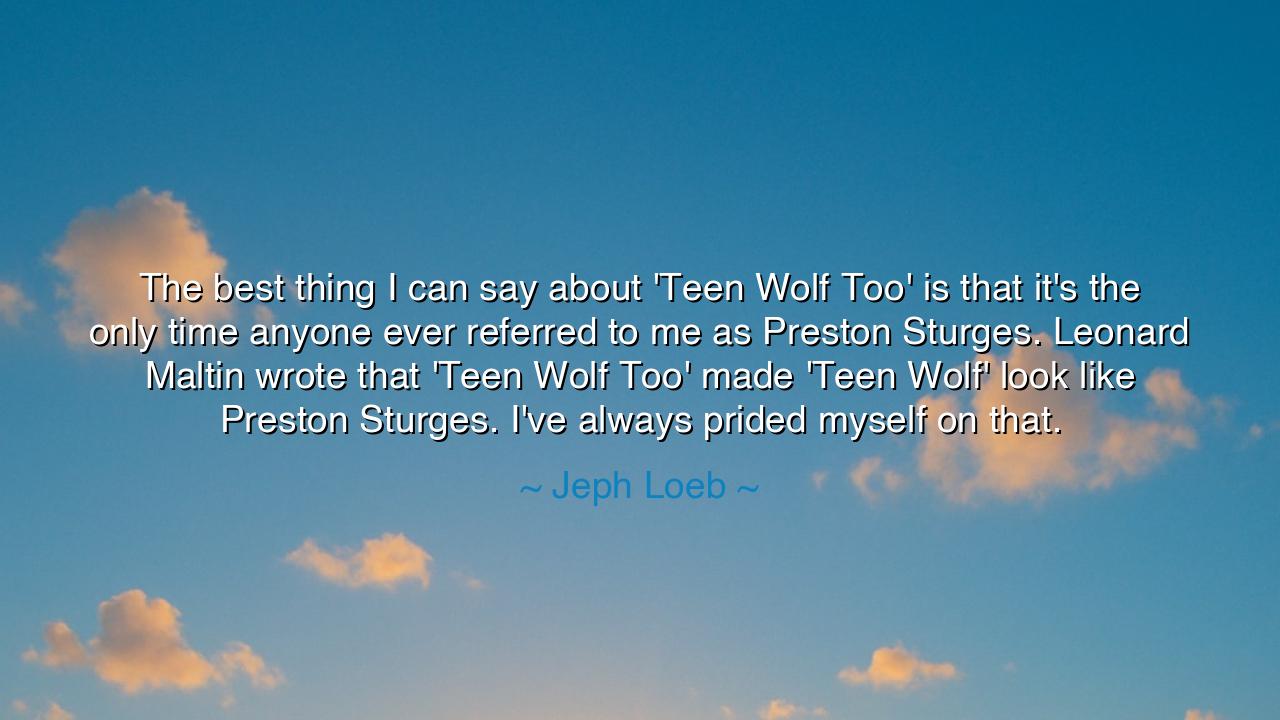
The best thing I can say about 'Teen Wolf Too' is that it's the
The best thing I can say about 'Teen Wolf Too' is that it's the only time anyone ever referred to me as Preston Sturges. Leonard Maltin wrote that 'Teen Wolf Too' made 'Teen Wolf' look like Preston Sturges. I've always prided myself on that.






When Jeph Loeb declared, “The best thing I can say about ‘Teen Wolf Too’ is that it’s the only time anyone ever referred to me as Preston Sturges. Leonard Maltin wrote that ‘Teen Wolf Too’ made ‘Teen Wolf’ look like Preston Sturges. I’ve always prided myself on that,” he spoke with both humor and wisdom about the paradox of creation: that sometimes recognition comes not from triumph, but from contrast, and even from unintended consequence. His words shine with irony, but beneath the irony lies a deeper lesson—that in art, as in life, one may find pride not in perfection, but in how one’s work illuminates the greatness of others.
The origin of this quote lies in the realm of cinema, where sequels often stumble in the shadow of their predecessors. “Teen Wolf Too” was such a work, regarded by many as lesser than the original Teen Wolf. Yet Loeb, rather than denying or lamenting this, chose to take pride in a sly compliment buried within criticism. When Leonard Maltin, a famed film critic, compared Teen Wolf to the films of Preston Sturges, he did so by way of diminishing the sequel. But in that judgment, Loeb found something to treasure: his work had, at least indirectly, elevated another film to the level of a master.
This reveals a truth long known in history: greatness is not always in direct achievement, but sometimes in the way one’s effort contributes to the greater conversation of art. Consider the sculptor of ancient Greece whose imperfect apprenticeships paved the way for the grandeur of Phidias, or the playwrights of Elizabethan England whose lesser works framed and magnified the genius of Shakespeare. Not every voice will be remembered as the loudest or brightest, but each voice contributes to the harmony of the whole.
Loeb’s pride in being compared, however indirectly, to Preston Sturges—one of the finest satirists and filmmakers of Hollywood’s golden age—speaks also to the nature of legacy. A man may not be remembered for his weakest work, but he may cherish that even in its weakness, it could point to something greater. This is the humility of the true creator: to find joy not only in one’s own glory, but in the way one’s efforts help others, even unintentionally, shine.
The deeper meaning here is that criticism, too, can be transformed into fuel. Where many would shrink from a harsh review, Loeb instead turned it into a badge of honor. He reminds us that failure, or even mediocrity, does not need to define us with shame. If approached with humor and perspective, it can enrich our journey, teaching us resilience and humility. To “always pride oneself on that” is to claim control over the narrative, refusing to let criticism wound, and instead letting it refine.
The lesson is clear: accept imperfection with grace, and find pride even in the shadows of your work. Not every endeavor will be a masterpiece, but every endeavor can carry meaning if you choose to see it rightly. When others compare, critique, or diminish, listen not only for the sting but for the hidden honor—because even criticism acknowledges that you are part of the story, that your work mattered enough to be judged.
Practical wisdom flows from this. If you create, do not despair when your work is not hailed as great. Ask instead: what role does it play in the larger tapestry? What can you learn, and how can you take pride in the unexpected gifts hidden in failure? If you face criticism, respond with humor, for humor disarms pain and turns loss into resilience. And above all, keep creating, for only through persistence can the occasional misstep be transformed into the stepping stone toward greater heights.
Thus, Jeph Loeb’s words, though cloaked in jest, carry the weight of enduring truth. To be compared, however obliquely, to Preston Sturges is a gift, even if born from irony. And so the teaching is this: cherish every recognition, even the backhanded ones. For in art, as in life, pride is not only in perfection but in persistence, in finding joy within imperfection, and in knowing that even your smallest work has a place in the grand design of human creation.






AAdministratorAdministrator
Welcome, honored guests. Please leave a comment, we will respond soon